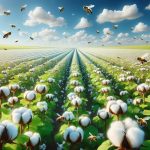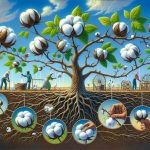Imagine a vibrant field of hemp swaying gently in the breeze, seemingly thriving on its own. But underneath that lush exterior lies a complex reality. You might wonder if hemp truly requires no pesticides or herbicides at all. While it’s often celebrated for its resilience, the truth about its cultivation is more layered than many realize. Let’s explore the factors that play into this debate and what it means for the future of hemp farming.
Table of Contents
Key Takeaways
- Hemp is vulnerable during early growth stages, making it sensitive to herbicides that can stunt growth and reduce yields.
- While hemp can thrive without pesticides or herbicides, effective weed management practices are essential to maintain healthy growth.
- Sustainable practices like mulching, crop rotation, and hand weeding can replace the need for chemical treatments while enhancing soil health.
- Regulatory landscapes vary, and some states may allow specific herbicides, but awareness of these regulations is crucial for safe cultivation.
- Research into biopesticides and organic alternatives is ongoing, supporting hemp cultivation without traditional chemical interventions.
Understanding Hemp’s Sensitivity to Herbicides
When you grow hemp, it’s crucial to understand its sensitivity to herbicides, as this can greatly impact your crop’s health and yield.
Hemp plants are particularly vulnerable during their early growth stages, making careful herbicide application critical. Even slight exposure can lead to stunted growth or reduced yields.
To protect your plants, consider alternative weed management strategies, like mulching or crop rotation. If you must use herbicides, choose those specifically labeled safe for hemp, and apply them at the right growth stage.
Always follow manufacturer guidelines and monitor your plants closely for any adverse effects. Being proactive about herbicide sensitivity allows you to cultivate a healthier, more robust hemp crop, ensuring better returns on your investment.
The Current Regulatory Landscape for Hemp Pesticides
As the hemp industry continues to grow, understanding the current regulatory landscape for hemp pesticides is vital for farmers and producers.
The legal framework surrounding hemp cultivation varies by state and can change frequently. The Environmental Protection Agency (EPA) oversees pesticide regulations, but states may impose additional restrictions specific to hemp.
You need to be aware of which pesticides are approved for use on hemp, as some chemicals can harm both the crop and the environment.
It’s important to stay updated on local regulations and any emerging guidelines, especially with the increasing interest in organic farming practices.
The Role of Ethalfluralin in Hemp Cultivation
Understanding the regulations surrounding hemp pesticides sets the stage for exploring specific substances that can impact hemp cultivation. Ethalfluralin is one such herbicide that helps manage weeds effectively. It offers a pre-emergent solution, preventing weed seeds from germinating while being relatively safe for hemp.
| Aspect | Ethalfluralin |
|---|---|
| Type | Herbicide |
| Application Method | Pre-emergent |
| Target Weeds | Annual grasses, broadleaf |
| Safety for Hemp | Relatively safe |
| Regulatory Status | Varies by region |
Alternative Weed Management Strategies
When it comes to managing weeds in hemp cultivation, you’ve got some effective alternatives to evaluate.
Mulching can help keep those pesky weeds at bay while enriching the soil, and hand weeding offers a precise way to tackle stubborn growth.
Let’s explore how these strategies can enhance your hemp farming practices.
Mulching Benefits
Mulching offers several benefits as an alternative weed management strategy for hemp cultivation. By covering the soil, mulch helps suppress weed growth, reducing competition for essential nutrients and water. It also retains soil moisture, which is crucial for healthy hemp plants. Additionally, organic mulch can improve soil structure as it decomposes, enriching the nutrient profile over time.
Here’s a quick look at its benefits:
| Benefit | Description |
|---|---|
| Weed Suppression | Reduces competition for nutrients and water |
| Moisture Retention | Keeps the soil hydrated during dry spells |
| Soil Improvement | Enhances soil structure and nutrient content |
| Temperature Regulation | Maintains consistent soil temperature |
| Erosion Control | Protects soil from erosion due to wind and rain |
Hand Weeding Techniques
While mechanical methods can be effective, hand weeding remains an essential alternative weed management strategy for hemp cultivation. This technique not only helps in controlling unwanted plants but also promotes healthier growth for your hemp.
Here are three hand weeding techniques you can use:
- Timing: Weeding early in the morning or after rain makes it easier to remove weeds, as the soil is softer and the plants are more visible.
- Tools: Utilize handheld tools like hoes or trowels to dig out weeds, especially those with deep roots.
- Regular Maintenance: Make it a habit to check your fields regularly, as consistent weeding prevents weed competition and reduces the overall workload later on.
The Impact of Herbicide Use on Hemp Yields
When you consider using herbicides on hemp, it’s vital to understand how they can impact your yields.
Certain herbicides may cause sensitivity in hemp plants, leading to reduced growth and lower harvests.
Exploring alternative weed control methods can be essential for maintaining healthy crops and maximizing your yield potential.
Yield Reduction Factors
Herbicide use can greatly impact hemp yields, often leading to unintended consequences that farmers mightn’t anticipate. When you apply herbicides, you might think you’re protecting your crop, but several factors can actually reduce your yields:
- Resistance Development: Continuous use of the same herbicide can lead to weed resistance, causing those weeds to flourish, which competes with your hemp for nutrients and water.
- Soil Health: Herbicides can harm beneficial soil microbes, disrupting nutrient cycling and ultimately affecting your crop’s growth and yield.
- Crop Stress: Some herbicides can cause stress in hemp plants, leading to stunted growth, lower flowering rates, and reduced overall yield potential.
Considering these factors is essential for maximizing your hemp production without relying heavily on herbicides.
Sensitivity to Herbicides
Understanding how hemp reacts to herbicides is vital for optimizing yields. Hemp’s sensitivity to certain herbicides can greatly impact its growth and overall productivity.
When you apply herbicides, it’s important to choose products that won’t adversely affect your plants. Some herbicides can cause stunted growth, reduced flowering, and lower seed production. If you notice adverse effects, it often means the herbicide’s active ingredients are harmful to hemp.
To maximize your yield, monitor your plants closely after application and adjust your herbicide choices based on their responses. Additionally, consider the timing of application, as hemp at different growth stages may react differently.
Alternative Weed Control Methods
Many hemp growers are exploring alternative weed control methods to reduce reliance on herbicides and mitigate their potential negative impacts on yields.
By implementing these strategies, you can enhance your crop’s health and sustainability. Here are three effective methods:
- Cover Cropping: Planting cover crops helps suppress weeds and improve soil health by adding organic matter.
- Mulching: Using organic or synthetic mulch can block sunlight, preventing weed growth while retaining moisture in the soil.
- Mechanical Weeding: Employing tools like hoes and cultivators allows for precise weed removal without harming your hemp plants.
Research and Development in Hemp Pest Management
As hemp cultivation continues to grow, effective pest management strategies are essential for maintaining healthy crops. Researchers are actively exploring natural pest control methods that minimize chemical intervention.
You might find it fascinating that studies are focusing on beneficial insects and companion planting to deter pests. Additionally, scientists are investigating the genetic resistance of certain hemp varieties to common pests, which could revolutionize how you approach crop protection.
Studies highlight the potential of beneficial insects and genetic resistance in hemp to transform pest management strategies.
Ongoing trials aim to develop eco-friendly biopesticides tailored for hemp, ensuring that your cultivation aligns with sustainable practices. By staying updated on the latest research, you can implement innovative methods that enhance your hemp production while protecting the environment.
Engaging with this evolving field can lead to healthier crops and potentially higher yields.
The Shift Towards Sustainable Hemp Production
The push for sustainable practices in hemp production is gaining momentum, driven by both consumer demand and environmental concerns. You’re seeing more farmers and companies adopting eco-friendly methods that not only benefit the planet but also enhance the quality of hemp products.
Here are three key reasons behind this change:
- Consumer Awareness: People are increasingly interested in where their products come from and how they’re made. Sustainable hemp appeals to eco-conscious buyers.
- Soil Health: Sustainable practices improve soil quality, leading to better crop yields over time, which can be more profitable for you as a farmer.
- Regulatory Support: Governments are beginning to incentivize sustainable farming practices, making it easier for you to adapt and thrive in the hemp market.
Future Directions for Hemp and Pesticide Use
While the future of hemp production looks promising, the integration of pesticides remains a critical concern for farmers and consumers alike.
The future of hemp production is bright, yet the role of pesticides poses significant challenges for both farmers and consumers.
As you explore hemp farming’s potential, consider adopting integrated pest management (IPM) strategies. These methods emphasize prevention, monitoring, and control, reducing the reliance on chemical pesticides. You might also want to research organic alternatives that align with sustainable practices, ensuring environmental safety while maximizing crop yield.
Looking ahead, collaboration between researchers and farmers can lead to innovative solutions tailored for hemp cultivation.
Embrace advances in biotechnology that could enhance pest resistance genetically. Ultimately, staying informed about regulations and consumer preferences will help you navigate the evolving landscape, ensuring that hemp remains a viable, eco-friendly option in agriculture.
Frequently Asked Questions
Can Hemp Be Grown Organically Without Any Pesticides?
Imagine walking through a lush field, sunlight dancing on vibrant green leaves. Yes, you can grow hemp organically without pesticides! By nurturing healthy soil and promoting biodiversity, you’ll cultivate a thriving, chemical-free environment for your plants.
What Are the Best Natural Weed Control Methods for Hemp?
To control weeds naturally in hemp, try mulching, cover cropping, and crop rotation. You can also use hand weeding and beneficial insects. These methods help maintain soil health while minimizing competition for your hemp plants.
How Does Hemp’s Growth Stage Affect Pesticide Sensitivity?
You might think all plants react similarly, but hemp’s sensitivity to pesticides changes with its growth stages. Early seedlings are more vulnerable, while mature plants often withstand treatments better, making timing essential for effective pest management.
Are There Any Pests That Specifically Target Hemp Crops?
Yes, hemp crops can attract specific pests like aphids and spider mites. You should monitor your plants closely, as these pests can affect growth and yield if not managed properly during the cultivation process.
What Is the Cost Impact of Using Organic Methods in Hemp Farming?
Using organic methods in hemp farming can increase costs initially due to natural inputs and labor. However, you’ll benefit long-term through healthier soil, higher-quality yields, and potentially better market prices for organic-certified products.
- Why Do My Linen Clothes Sometimes Develop Pills? - June 11, 2025
- How to Remove Pilling From Chenille Fabric Without Snagging It? - June 11, 2025
- What’s the Best Way to Store Clothes to Minimize Pilling Risks? - June 11, 2025





